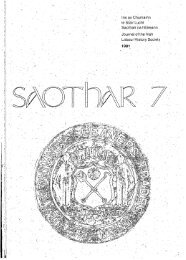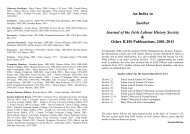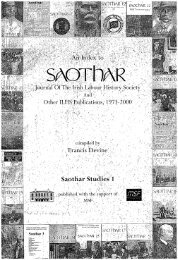90 SAOTHAR 13education 'quite equal to that of a skilled artisan'. According to Haddow, the indigenous minersexpressed resentment towards 'the untrained Irishmen who flock into the pits'. In a paragrapharticulating the typical racist sentiments of the time, Haddow said: 'B ut differences there are, and thechief one is that the ScotocIrishman seldom seeks to rise or get beyond where he is. He is clamorousindeed for big wages, and is generally a strong union man, whereas the Scotsman as a rule looks askanceon unions and the men who manage and manipulate them. As one of a crowd the Scoto-Irishman is loudin the demand for what he thinks his rights ... The strain of Irish blood is predominant in him, he likesto have a grievance and to ail his discontent'. But in most other anti-Irish writings, the Irish-Catholicimmigrants did play an important role in the Scottish labour movement. Haddow was not a particularlyreliable chronicler of working class self-activity.4In the recently published A Century of the Scottish People, 1830-1950, T.C. Smout asserts that amajor weakness of Scottish socialism was 'theinability of the Independent Labour Party (in the 1890s)to carry the Irish, who were deterred by their priests from backing obvious socialists, and equally wereoften putoffby the visible distaste of men like Keir Hardie and Bruce Glasier for Irishmen, whom theystill openly inclined to regard as simple victims of superstition and POpery'.5 Yet despite the very visibleand widespread anti-Catholic and anti-Irish prejUdices in the labour movement as well as in the widerScottish society from 1880 onwards, the gradual growth of the important twentieth-century Catholicvote behind Labour and socialist candidates in Parliamentary elections was the outcome of the IrishCatholic immigrants' social assimilation.6Notwithstanding the powerful anti-Catholic prejudices in Scottish society between 1880 and 1926,the Irish-Catholic immigrants and their descendants played a crucial and often pioneering role in thedevelopment of modem socialism. Indeed, the Irish-Catholic immigrants' assimilation into the Scottishlabour movement began about 1880. In 1881 a few Irish-Catholic immigrants were active in theabortive attempt to found a Scottish Labour Party in Lanarkshire under the leadership of John Dunn;7and in 1885 the immigrants' newspaper, The Exile, was already chronicling their activities in the labourmovement. sWhilst the Scottish labour movement played a crucial role in the process of assisting the IrishCatholic immigrants to assimilate into the wider society, the indigenous Scots developed a dualconsciousness.In depicting the consciousness of the Scottish working class from Chartist times, S moutargues that: 'Such dualities of consciousness -of being Scottish and British, of being Breton and French,of being Catalan and Spanish - have been much commoner in European history since 1800 than is oftenacknowledged'.9 Just as the indigenous working class Scots often displayed duali ties of consciousness,so the Irish-Catholic immigrants developed a dual-identity within Scottish society between 1880 and1926 ..In discussing the problems of such dualities of consciousness, Hobsbawm argues that: 'An Irishlabourer migrating to Boston, his brother who settled in Glasgow, and a third brother who went toSydney would remain Irish, but become part of three different working classes with different histories.At the same time, and as this example suggests, it is also wrong to assume that the members of suchnational working classes are or ever were homogeneous bodies of Frenchmen, Britons or Italians, or,even when they saw themselves as such, that they are not divided by other communal demarcations,or that they are exclusively identified with the State which defines their effective existence as a classand an organised movement'.lDIn a pioneering book, The Irish in Modern Scotland, the late Father James Handley was verysensitive to the Irish-Catholic immigrants' dual-identity. Although he did not deal with the pioneeringwork of the Irish-Catholic immigrants in the Scottish labour movement in the 1880s and 1890s, hecoped with the implicit question of their dual-identity by devoting a chapter to what he characterisedas 'the Scoto-Irish'. Nevertheless there was considerable evidence of the role of Catholic priests, theAmerican Knights of Labour and the individual endeavours of Michael Davitt, Dr. William Carroll ofPhiladelphia, and John Murdoch, the crofters' leadcr, in raising socialist consciousness in the coalfieldsof the west of Scotland.!!
ESSAYS" 91Although anti -Catholic prejudice remained strong in Scotland throughout the inter-war period, andalthough Scottish newspapers seldom used the expression' Scoto-Irish' after the Easter Rising of 1916,the intense antagonism and abuse engendered by the Orange Order ensured the survival of the dualidentityof the Irish-Catholic immigrants until 1922. When S. V. Bracher published The Herald Booko/Labour Members in 1923, he did not quite know how to describe the immigrants. In a sympatheticaccount of Joseph Sullivan, who had just been elected to Parliament for the North Lanarkshireconstituency in 1922, Bracher described him as 'an Irish Scot', though Sullivan had been born inCambuslang, Lanarkshire, in 1866.12Nevertheless the processes unleashed by the First World WaT assisted the Irish -Catholic immigrantsand their descendants to assimilate into Scottish society. Despite the Presbyterian Churches' intensifiedanti-Catholicism, the role of the 1918 Education Act in providing the Irish-Catholics with their ownseparate schools under the State system and the granting of a measure of Irish self-government helped"the process of assimilation. Furthermore, dualities of consciousness and dual-identity are not eternalor unchanging. By 1926 sectarian bigotry no longer kept the Irish-Catholic immigrants out of anysection of the labour movement: they were prominent in the General Strike in Glasgow, Perth, andFalkirk. 13Social being determines social consciousness, and some Marxists still insist that the way anindividual sees himlherself is part ofhislher 'social being'. By social being Marx meant something likecollective being (social experience) and by social consciousness he indicated something like commoncultural life. If so, the way an individual sees himlherself is individual consciousness - and certainlynot 'social being'.14The mid-Victorian labour movement was engendered within a specific national context in whichPrebyterian traditions, values and attitudes impinged on the consciousness of working men and women.The anonymous author of a study of British coal miners asserted that in Lanarkshire and the West ofScotland 'only the Irish or the worst of the Scotch from other counties' belonged to the miners' tradeunions'. But although the Irish were marginalised economically as part of the Scottish working class,they had a cultural cohesion as Irish immigrants. Moreover, when modern socialism was born in "the1880s, the Irish workers in Scotland had a greater potential to become labourites/socialists. 15 Racialprejudice was not only discernible later on; it was, in fact, very m uch accelerated. Far from the Scottishproletariat - and especially the disharmonious, foreign compdnent part of it, the Irish immigrants andtheir descendents - being stripped of national character between 1880 and 1926, it actually struggledto articulate the double national identities of working men and women who carried a distind culturalbaggage into the new factories, mills and coal mines. Instead of recognising and acknowledging thiscentral aspect of Scottish working class history, the dominant historiography focuses on uniqueindividual leaders - for example, James ConnoIly (1870-1916) and John Wheatley (1869-1930) -without attempting to relate them to the wider social and political forces unleashed by the process ofcapitalist modernisation within a particular national milieu.Long before Home Rule for Ireland became a controversial issue in Scottish working classcommunities in the 1880s, ethnic conflict and religious sectarianism coloured social, intellectual andpolitical life. While the intensity of religious sectarianism was reflected in nineteenth century books,novels and newspapers, the hidden assumptions of the dominant Presbyterian historiography obscurethe efforts o(those historians who want to portray the contribution of the Irish immigrants and theirdescendants to the Scottish working class movement.The Irish immigrants played an important role in the Irish National League in Scottish communitiesas well as in the infant Scottish Labour Party (cf. John Ferguson and R. Chisholm Robertson) and theSocial Democratic Federation. 16 In using a remarkably accurate phrase' Irishmen as Scottish socialists' ,H.W. Lee and E. Archbold went on to say that 'some of the best comrades in the socialist movementin Scotland were Irishmen' .17 The best known and most prominent of them included James ConnoUy,John Leslie (1856-1921), R. Chisholm Robertson, J. Shaw MaxweIl (1885-1929), Patrick or"PeteCurran, John Wheatley, Fred Douglas, Andrew McNally and Harry McShane. But although thos~
- Page 1 and 2:
JOURNAL OF THE IRISH LABOUR HISTORY
- Page 3 and 4:
ContentsPageEditorial: Labour Histo
- Page 5 and 6:
EDITORIAL 3freedom to participate i
- Page 7 and 8:
CorrespondenceThe Irish Labour Part
- Page 9 and 10:
; ~ ; ,The Decline and Fall of Donn
- Page 11 and 12:
THE DECLINE AND FALL OF DONNYBROOK
- Page 13 and 14:
THE DECLINE AND FALL OF DONNYBROOK
- Page 15 and 16:
·' THE DECLINE AND FALL OF DONNYBR
- Page 17 and 18:
THE DECLINE AND FALL OF DONNYBROOK
- Page 19 and 20:
THE DECLINE AND FALL OF DONNYBROOK
- Page 21 and 22:
THE DECLINE AND FALL OF DONNYBROOK
- Page 23 and 24:
THE DECLINE AND FALL OF DONNYBROOK
- Page 25 and 26:
,'-,;-''''.A PASSAGE TO BRITAIN 23C
- Page 27 and 28:
A PASSAGE TO BRITAIN 25only in the
- Page 29 and 30:
A PASSAGE TO BRITAIN 27clothing._De
- Page 31 and 32:
A PASSAGE TO BRITAIN 29established
- Page 33 and 34:
;:-.",.- .. .", ...... '.:. '
- Page 35 and 36:
LOUIE BENNETI 33feminist movement w
- Page 37 and 38:
:... ~: ."
- Page 39 and 40:
-.- '.LOUlE BENNETT 37While there i
- Page 41 and 42: LOUIE ~ENNEIT 39Xl's encyclical Qua
- Page 43 and 44: LOUIE BENNEIT 41Bennett's own relat
- Page 45 and 46: LODIE BENNETT 43109; IWWU resolutio
- Page 47 and 48: Essays in ReviewCosherers, Wanderer
- Page 49 and 50: ••• .".'. >. '~"ESSA YS IN RE
- Page 51 and 52: ESSAYS IN REVIEW 49ConnolIy:Myth an
- Page 53 and 54: ESSAYS IN ~EVIEW 51tion' in the Int
- Page 55 and 56: ESSAYS IN REVIEW53International:'I
- Page 57 and 58: REVIEWScontroversy is real history.
- Page 59 and 60: REVIEWSJoe Monks was among the earl
- Page 61 and 62: REVIEWSnolly-Column Song','Proudly
- Page 63 and 64: REVIEWSresulting from the arrival o
- Page 65 and 66: REVIEWS,63the book by means of an a
- Page 67 and 68: REVIEWSlogue, it is hardly surprisi
- Page 69 and 70: The Team For All Workers ...CULIAIB
- Page 71 and 72: ESSAYS 69mission and moral refonn.l
- Page 73 and 74: .. ...... ~.~ -~ .'- '.ESSAYS. 71fr
- Page 75 and 76: ESSAYS 73claimed authority but whic
- Page 77 and 78: ESSAYS 75provided the basis for soc
- Page 79 and 80: ESSAYS 779. For comparisons see E.T
- Page 81 and 82: ESSAYS 7952. Annals of Christ Churc
- Page 83 and 84: ESSAYS' 81Fianna Fail and the Worki
- Page 85 and 86: ESSAYS 83Eireann in 1925 visibly di
- Page 87 and 88: ESSAYS 85recognition of the impract
- Page 89 and 90: ESSAYS 871970, it created the condi
- Page 91: ESSAYS89The Irish Immigrants' Contr
- Page 95 and 96: ESSAYS 93McCowie played a key role
- Page 97 and 98: :. -,,'.' ',. .~.,:.ESSAYS 95Althou
- Page 99 and 100: ESSAYS 97young girl of their own ba
- Page 101 and 102: SourcesIrish Labour History Society
- Page 103 and 104: SOURCES 101INovember, 1971 to no. 1
- Page 105 and 106: SOURCES 103would claim credit for t
- Page 107 and 108: SOURCES105Sources for Irish Labour
- Page 109 and 110: SOURCES 107NorthWest Archives and L
- Page 111 and 112: SOURCES 109In 1966 the Finnish gove
- Page 113 and 114: TURNINGANEWLEAFThe CPSSUis the larg
- Page 115 and 116: REMINISCENCE 113us due to my politi
- Page 117 and 118: REMINISCENCE 115when Jim was presen
- Page 119 and 120: REMINISCENCE 117of Dail Eireann. 17
- Page 121 and 122: REMINISCENCE 119NotesThe above arti
- Page 123 and 124: DOCUMENT STUDY 121James Connolly in
- Page 125 and 126: DOCUMENT STUDY123SOCIAL DEMOCRATIC
- Page 127 and 128: DOCUMENT STUDY 125proletariat of th
- Page 129 and 130: DOCUMENT STUDY 127the support of Je
- Page 131 and 132: DOCUMENT STUDY 12926. The Workers'
- Page 133 and 134: 131BibliographyA Bibliography of Ir
- Page 135 and 136: BIBLIOGRAPHY 133Compton, P.A. Demog
- Page 137 and 138: BIBLIOGRAPHY 135Levine, I. and Madd
- Page 139 and 140: BIBLIOGRAPHY 137Turner, M. 'Towards
- Page 141 and 142: BIBLIOGRAPHY 1394. Land and Agricul
- Page 143 and 144:
BIBLIOGRAPHY 141Clogher Record12 (2
- Page 145 and 146:
BIBLIOGRAPHY 143Political Research
- Page 147 and 148:
BIBLIOGRAPHY 145Pres, 1987.O'Brien,
- Page 149 and 150:
147Notes on Contributorsf onathanBe
- Page 151 and 152:
1901: Ireland's first general union
- Page 153 and 154:
ELECTRICAL TRADES UNION .Establishe





